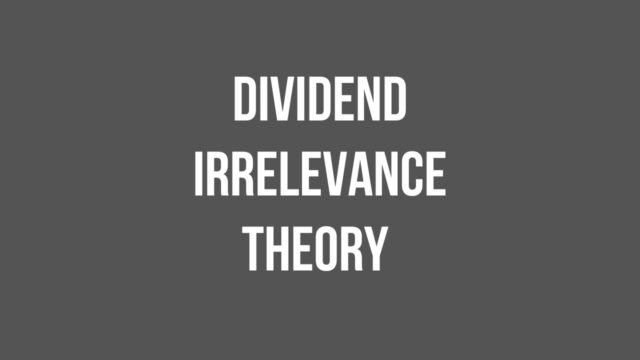
The dividend irrelevance theory is a financial principle that suggests the value of a company’s stock is not affected by its dividend policy. This means that investors should not factor in dividends when making decisions regarding the purchase or sale of stocks. Let’s explore this concept further and discuss why it matters to investors.
What is Dividend Irrelevance Theory?
The dividend irrelevance theory was first proposed by economist Myron Gordon in the 1950s. According to Gordon, stock prices are determined solely by their underlying assets and potential for capital gains (i.e., the future prospects of the company).
In other words, dividends don’t play a role in determining the value of a company’s stock. Therefore, investors should focus on factors such as expected earnings growth, risk/return profiles, and industry trends when making decisions about stocks instead of looking at dividend payouts.
Why Does Dividend Irrelevance Matter?
The main takeaway from dividend irrelevance is that investors shouldn’t be swayed by dividends when choosing which stocks to buy or sell. This is because if a company’s stock price increases due to higher earnings or other positive developments unrelated to its dividend policy, then any increase in the value of its dividends will likely be very small compared to the overall rise in share price.
As such, investors should focus more on factors like earnings growth and risk/return profiles when deciding which stocks to purchase or sell instead of focusing on dividends alone.
Why Are Dividends Still Popular?
Despite what the dividend irrelevance theory suggests, many investors continue to rely heavily on dividends when selecting stocks for their portfolios. This is because dividends provide a reliable source of income that can help offset losses from fluctuations in stock prices over time.
Moreover, some companies offer high-yield dividends that can potentially generate larger returns than those generated through capital gains alone. As such, it may make sense for some investors to continue taking advantage of these attractive dividend payouts despite what the theory suggests.
The Benefits of Dividend Irrelevance Theory
The main benefit of the dividend irrelevance theory is that it encourages companies to maximize their profits rather than pay out dividends to shareholders. Companies are free to use their profits as they see fit, which could mean reinvesting them back into the company or expanding operations.
This gives companies more flexibility when it comes to making financial decisions and allows them to focus more on long-term growth rather than short-term gains from dividend payments.
The Drawbacks of Dividend Irrelevance Theory
One potential drawback of this theory is that it may make some investors wary of investing in dividend stocks because they don’t see any immediate benefits from doing so.
Additionally, some investors may be discouraged from holding onto a stock if there are no dividends being paid out since they will not receive any income from holding onto the stock for an extended period of time.
Lastly, some believe that dividend payments can act as a signal for a company’s value since companies tend to pay out dividends when they are doing well financially and thus can be seen as a good indicator for future performance.
Conclusion:
In summary, while dividend irrelevance theory suggests that investor decisions shouldn’t be based solely on a company’s dividend policy, there are still many valid reasons why some investors may choose to focus on dividends when selecting stocks for their portfolios.
Ultimately, it’s important for each individual investor to consider all relevant factors—including both potential capital gains and income from dividends—when making decisions about which stocks they should invest in or sell off. By doing so, they can ensure they’re making informed investment choices that will help them reach their long-term financial goals with greater success.


































